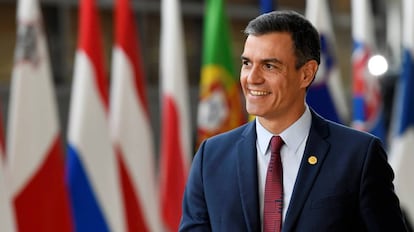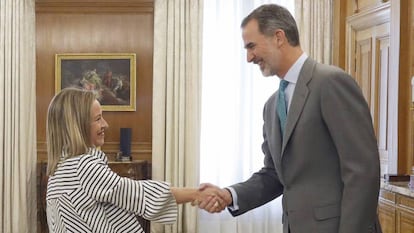Spanish PM plays waiting game ahead of bid for a second term
In a fractured post-election scenario, Pedro Sánchez is keeping his Socialist Party’s options open until all groups have made their positions clear

Spanish political parties have been meeting with King Felipe VI to discuss who they will support to be the next prime minister ahead of an investiture vote expected for the first or second week of July.
But amid these talks, the Socialist Party (PSOE), which won the highest number of seats at the April 28 general election but fell short of an absolute majority, has remained notably silent.
Sánchez has always liked to play a leading role in negotiations. But not this time
Ana Oramas, a lawmaker with the small regional party Canary Coalition (CC) with years of experience in negotiations, put it bluntly: “It is the first time in 11 years that we have arrived at the round of talks with the king without having a single conversation with the investiture candidate or their team.”
Oramas maintained that her party’s two members of Congress will not help PSOE leader Pedro Sánchez secure a second term in office. But on the same day that PSOE lost these two votes, it won the option of replacing them with two others from the Navarrese People’s Union (UPN).
Different options
The fractured results of the general election mean that there are many ways for Sánchez to be sworn in as prime minister in the second round of the investiture vote, where only a simple majority is required (more yes votes than no votes).
The Socialists appear to be playing a waiting game while other parties – especially the center-right Ciudadanos (Citizens) and the far-right Vox – hold numerous meetings, negotiate with one another, and deal with infighting.

The PSOE is open to all options, even to a deal with Ciudadanos, which may ultimately prove too difficult. And it has managed to keep its options open without hardly entering into negotiations. “The PSOE is not calling anybody because it is taking its time to see if there are other allies around,” said Alberto Garzón, the leader of United Left, which joined forces with the anti-austerity party Podemos at the general election to run as Unidas Podemos.
Podemos is concerned that Sánchez might be able to convince Ciudadanos to abstain at the second investiture vote, which would give the PSOE a clear simple majority and make Podemos’s 42 votes far less valuable. While it is an unlikely option, it is not impossible. Ciudadanos leader Albert Rivera has said that his party would vote against Sánchez, and the leader of the conservative Popular Party (PP), Pablo Casado, has also indicated the PP would vote no. But with so many players in the ring, the game could yet change.
Podemos leader Pablo Iglesias is hoping for a coalition government with the PSOE and several ministerial positions for leading members of his Unidas Podemos group. But Sánchez would rather lead a minority government and the fact that Podemos did poorly at local and regional elections held on May 26 has worked in his favor.
New strategy
Sánchez has liked to play a leading role in negotiations ever since he took power in June 2018 after leading a successful no-confidence motion against former Prime Minister Mariano Rajoy of the PP. But this time around he is following the strategy of his predecessor, who always waited to see how the pieces fell before making a move.
The PSOE is not calling anybody because it is taking its time to see if there are other allies around
United Left leader Alberto Garzón
Legal formalities require King Felipe VI to talk to all the main political leaders about the possibilities of a successful bid for the prime minister’s office. He will then inform congressional speaker Meritxell Batet whether he is officially proposing Pedro Sánchez, the top candidate as he won the most votes on April 28. If so, the latter will be given enough time to reach cross-party deals before putting his nomination to the vote inside Congress. The investiture debate could theoretically take place either the first or the second week of July, said acting government spokeswoman Isabel Celaá.
There is a precedent for failure in the recent past. Following the December 2015 elections, winner Mariano Rajoy did not secure enough support for a successful investiture bid and he refused to submit to a vote. Sánchez stepped up, but was voted down in Congress. This led to a repeat election in June 2016.
English version by Melissa Kitson and Susana Urra.
Tu suscripción se está usando en otro dispositivo
¿Quieres añadir otro usuario a tu suscripción?
Si continúas leyendo en este dispositivo, no se podrá leer en el otro.
FlechaTu suscripción se está usando en otro dispositivo y solo puedes acceder a EL PAÍS desde un dispositivo a la vez.
Si quieres compartir tu cuenta, cambia tu suscripción a la modalidad Premium, así podrás añadir otro usuario. Cada uno accederá con su propia cuenta de email, lo que os permitirá personalizar vuestra experiencia en EL PAÍS.
¿Tienes una suscripción de empresa? Accede aquí para contratar más cuentas.
En el caso de no saber quién está usando tu cuenta, te recomendamos cambiar tu contraseña aquí.
Si decides continuar compartiendo tu cuenta, este mensaje se mostrará en tu dispositivo y en el de la otra persona que está usando tu cuenta de forma indefinida, afectando a tu experiencia de lectura. Puedes consultar aquí los términos y condiciones de la suscripción digital.








































